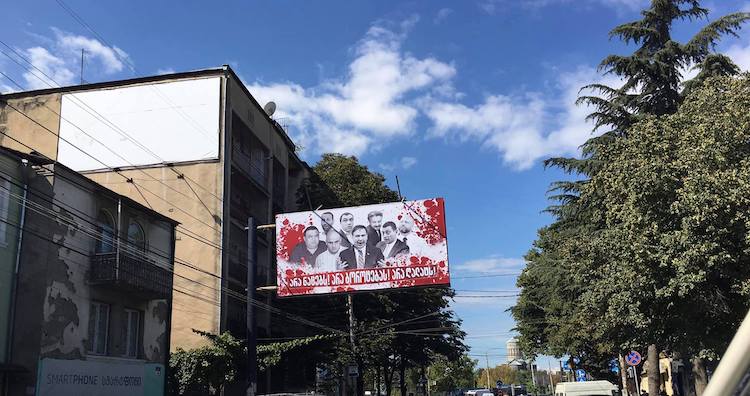Opposition leader Khoshtaria files complaint in Central Election Commission over ‘bloody’ opposition billboards

The ‘bloody’ billboards first appeared on the streets of Tbilisi on September 17 in the run up to the October 2 municipal elections and soon after they were displayed in other cities of Georgia as well. Photo: Nazi Janezashvili/Facebook.
Political movement Droa leader Elene Khoshtaria, who is the united opposition’s joint candidate for the City Council (Sakrebulo) chair in the upcoming local elections, has filed a complaint in the Central Election Commission (CEC) over billboards which portray opposition politicians as ‘bloody.’
The billboards feature opposition political leaders, including former Prime Minister Giorgi Gakharia who resigned earlier this year and the media managers of two opposition-minded TV channels Nika Gvaramia and Nodar Meladze from Mtavari Arkhi and TV Pirveli which reads: ‘No to Natsis (referring to the largest opposition United National Movement (UNM) party), No to evil, No to betrayal.’
Elene Khoshtaria said that the ruling Georgian Dream (GD) party stands behind the billboards, noting that it is an ‘infringement of the law.’
All campaign materials must have an indicated author...We have no illusions that either the CEC will act fairly or the GD will change its mind,” Khoshtaria stated.
A photo was published on Facebook yesterday showing that a Covid-19 vaccination banner was replaced by the ‘bloody’ billboard.
The National Centre for Disease Control (NCDC) of Georgia stated that they condemn the fact if the action really took place, noting that the NCDC has nothing to do with it.
Head of the ruling party Irakli Kobakhidze responded to the issue and said that opposition-minded TV channels are ‘the source of hate speech and aggression.’
Naturally when so much hatred flows from one side, there may be an answer from the other side as well,” Kobakhidze stated.
Businessman Mikheil Gabriadze claimed that he and his friends are the authors of the ‘bloody’ billboards and noted that he does not belong to any political party.
The GD candidate for Tbilisi mayor, incumbent Kakha Kaladze, said that the billboards belong to advertising company ALMA and the City Hall has no right to interfere.
However, ALMA stated they have no connection with the ‘bloody’ billboard’s content or design and said that they ‘only sell and rent space on constructions for banners.’
Although we acknowledge the freedom of expression of any subject and the need to ensure it, the content of the above-mentioned advertising banners is unacceptable to us,” ALMA states.
The ‘bloody’ billboards first appeared on the streets of Tbilisi on September 17 in the run up to the October 2 municipal elections and soon after they were displayed in other cities of Georgia as well.
 Tweet
Tweet  Share
Share